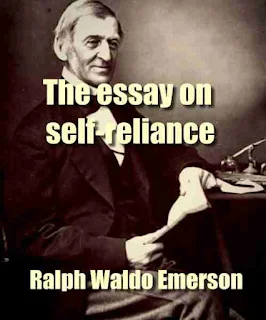The essay on self-reliance
From introduction:
Cast the bantling on the rocks,
Suckle him with the she-wolf teat:
Wintered with the hawk and fox,
Power and speed be hands and feet.
Read the other day some verses written by an eminent painter which were original and not conventional. Always the soul hears an admonition in such lines, let the subject be what it may. The sentiment they instil is of more value than any thought they may contain.
To believe your own thought, to believe that what is true for you in your private heart, is true for all men, that is genius. Speak your latent conviction and it shall be the universal sense; for always the inmost becomes the outmost, and our first thought is rendered back to us by the trumpets of the Last Judgment. Familiar as the voice of the mind is to each, the highest merit we ascribe to Moses, Plato and Milton, is that they set at nought books and traditions, and spoke not what men, but what they, thought.
A man should learn to detect and watch that gleam of light which flashes across his mind from within, more than the lustre of the firmament of bards and sages. Yet he dismisses without notice his thought because it is his.
In every work of genius, we recognize our own Reliance rejected thoughts: they come back to us with a certain alienated majesty. Great works of art have no more affecting lesson for us than this. They teach us to abide by our spontaneous impression with good-humoured inflexibility then most when the whole cry of voices is on the other side. Else, tomorrow a stranger will say with masterly good sense precisely what we have thought and felt all the time, and we shall be forced to take with shame our own opinion from another.
There is a time in every man's education when he arrives at the conviction that envy is ignorance; that imitation is suicide; that he must take himself for better, for worse, as his portion; that though the wide universe is full of good, no kernel of nourishing corn can come to him but through his toil bestowed on that plot of ground which is given to him to till.
The power which resides in him is new in nature, and none but he knows what that is which he can do, nor does he know until he has tried. Not for nothing one face, one character, one fact makes many impressions on him, and another none.
Download 4.8 MB


